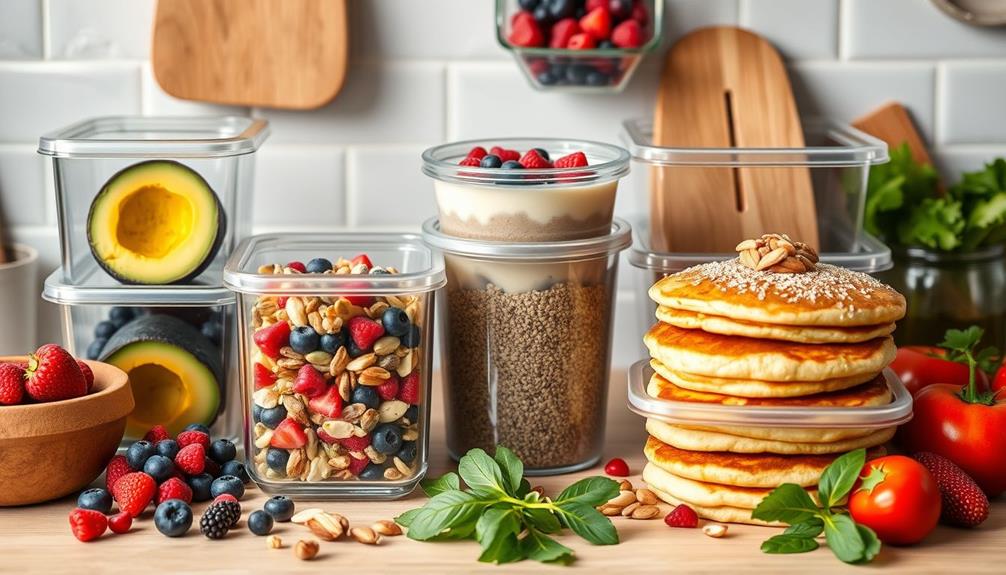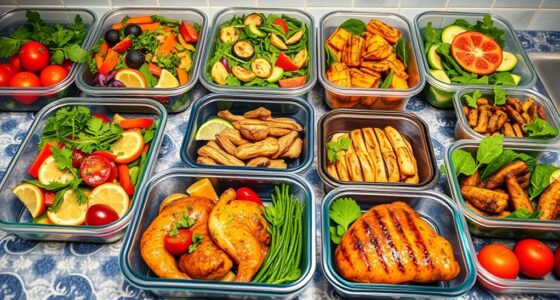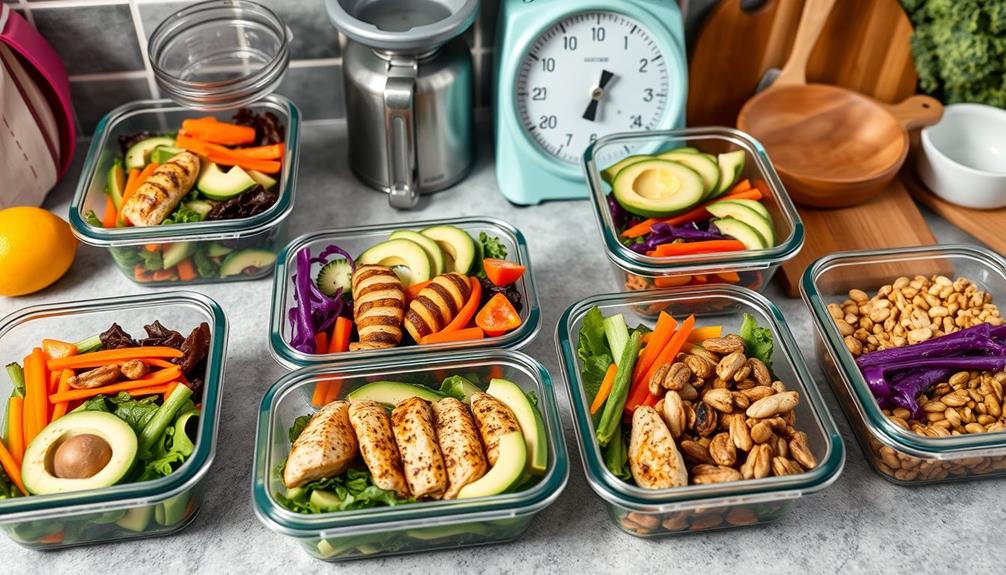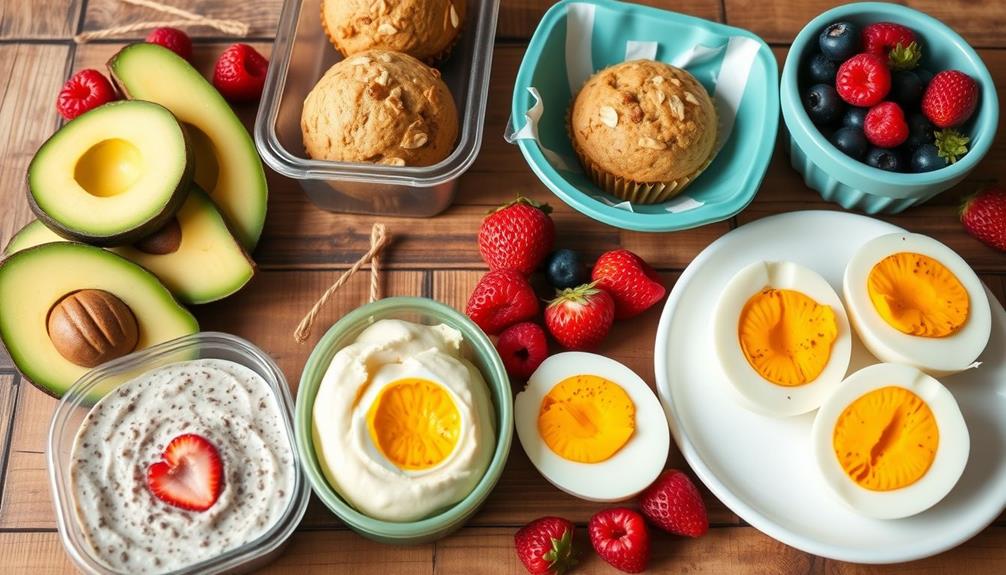To simplify family meal prep, plan your weekly menu ahead by choosing simple, healthy recipes everyone enjoys. Get the whole family involved in shopping, chopping, and cooking to make it fun and educational. Batch cook and prepare ingredients in advance to save time and reduce stress during busy weekdays. Storing ingredients properly and using versatile items can cut costs and waste. Keep exploring ways to make meal prep a bonding time and improve your family’s nutrition.
Key Takeaways
- Develop a weekly meal plan with simple, nutritious recipes suitable for all family members.
- Involve family members in meal prep to teach skills and foster teamwork.
- Create a detailed grocery list focused on versatile, minimally processed ingredients.
- Prepare ingredients ahead of time to streamline cooking during busy weekdays.
- Incorporate seasonal and local foods to add variety and support sustainable eating habits.

Preparing family meals together can save time, reduce stress, and encourage healthier eating habits. When you focus on meal planning, you create a clear roadmap for what everyone will eat during the week, which makes grocery shopping more efficient and prevents last-minute takeout or unhealthy snack choices. By dedicating a little time to plan your meals ahead, you can select healthy recipes that suit your family’s tastes and nutritional needs. This approach not only streamlines your daily routine but also helps instill better eating habits for everyone involved.
Start by sitting down as a family or on your own to map out the week’s meals. Look for healthy recipes that are simple to prepare and appeal to different age groups. Incorporate a variety of fruits, vegetables, lean proteins, and whole grains to ensure balanced nutrition. When choosing recipes, consider ones that can be made in bulk or repurposed for multiple meals, saving you cooking time on busy days. For example, roasting a large batch of vegetables or cooking a big pot of grains can serve as the foundation for several dishes, from salads to wraps.
Once you’ve settled on your meal plan, write down your shopping list, focusing on fresh, wholesome ingredients. Buying in bulk and opting for versatile ingredients can cut down costs and reduce waste. Preparing some ingredients in advance, such as chopping vegetables or cooking grains, can appreciably cut down on cooking time during busy weekday evenings. This way, when it’s time to cook, you can quickly assemble meals without feeling overwhelmed. Additionally, understanding the importance of food preservation can help minimize food waste and keep ingredients fresh longer, especially when utilizing proper storage techniques aligned with mindfulness practices.
Cooking together as a family doesn’t just make mealtime more fun; it’s an excellent opportunity to teach kids about nutrition and cooking skills. Assign age-appropriate tasks, like washing vegetables, stirring ingredients, or setting the table. As you prepare meals with healthy recipes, your children learn to appreciate nutritious foods and develop positive habits early on. Plus, involving everyone in the process fosters a sense of teamwork and shared responsibility.
In addition, understanding the importance of foraging can inspire families to explore local, sustainable food sources and incorporate fresh, wild ingredients into their meals. Incorporating meal planning into your weekly routine can turn mealtime from a stressful chore into a bonding experience. It helps you stay organized, eat healthier, and spend less time deciding what to cook last minute. Over time, this consistency builds a foundation for a balanced, nourishing diet for your entire family. With a little preparation and collaboration, you can enjoy delicious, wholesome meals every day without the usual chaos.
Frequently Asked Questions
How Can I Involve Children in Meal Prep Safely?
To involve children in meal prep safely, focus on child safety by supervising their activities closely. Assign age-appropriate tasks, like washing vegetables or stirring ingredients, that match their skill level. Use child-friendly utensils and keep sharp tools out of reach. Encourage them to participate actively, making the experience fun and educational. This approach helps children learn kitchen safety while contributing to meal preparation confidently and securely.
What Are Quick Meal Ideas for Busy Weekdays?
When you’re looking for quick meal ideas for busy weekdays, focus on simple, nutritious options. Use meal prepping tips like batch cooking to save time and have ready-to-eat meals. Incorporate quick snack ideas such as fruit, nuts, or yogurt to keep everyone energized. Keep ingredients versatile and prep ahead of time so you can assemble meals quickly, making your weekdays smoother and less stressful.
How Do I Accommodate Food Allergies During Meal Planning?
When accommodating food allergies, you should focus on allergy-friendly ingredients and always practice label reading tips. Start by carefully checking labels to spot potential allergens, and choose natural, unprocessed foods when possible. You can also experiment with substitutions to create safe, delicious meals. Planning ahead guarantees you avoid cross-contamination and tailor dishes to your specific allergy needs, making mealtime safer and enjoyable for everyone.
What Are Cost-Effective Strategies for Family Meal Prep?
To save money on family meal prep, you should focus on bulk shopping and meal batching. Buy staple ingredients in bulk to reduce costs and store extras for later use. Batch cooking large portions allows you to prepare multiple meals at once, saving time and effort. These strategies help you cut expenses while ensuring your family has nutritious, home-cooked meals throughout the week.
How Can I Reduce Food Waste While Meal Prepping?
Think of yourself as a steward of the Earth, just like in “Wall-E.” To reduce food waste during meal prep, use smart storage solutions to keep leftovers fresh, and practice composting tips for scraps. Store ingredients properly to extend their life, and plan meals to use ingredients efficiently. By staying mindful and organized, you minimize waste and contribute to a healthier planet, one meal at a time.
Conclusion
With a solid plan in place, you’re the captain steering your family’s ship through the busy seas of mealtime. Each chop, stir, and plate you prepare fuels your crew’s energy and happiness. Remember, meal prep is your secret toolkit—turning chaos into calm and ingredients into memories. So, embrace the journey, savor the flavors, and watch your family flourish around the table like a vibrant garden in full bloom.









